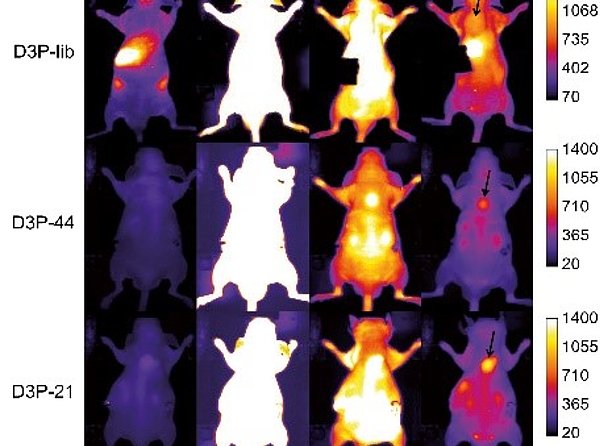Aptamer D3P-21 - An Aptamer that Targets Hormone Refractory Prostate Cancer
Ref.-Nr. 5463
Keywords: Aptamer, Hormone Refractory Prostate Cancer
Prostate cancer is the most common cancer among men. In particular, hormone refractory prostate cancer is not curable and targeted therapies are yet not available. Hormone refractory prostate tumour cells likely metastasize to distal sites accounting for poor prognosis and survival of patients. Thus, means for early diagnosis and treatment of hormone refractory prostate cancer are desperately needed. Aptamers are an emerging class of molecules for developing targeted therapy approaches. They are single chain nucleic acids, folding into well-defined three-dimensional shapes based on which they recognize target structures. The inventors used an orthotopic xenograft mouse model to perform an in vivo selection in order to identify an aptamer that selectively binds to cells of a hormone refractory prostate tumour. Several rounds of selection starting from a DNA library yielded an aptamer that binds to tumour tissue in vivo and to PC3 cells in vitro. The Aptamer is characterized in a PEGylation pattern that stabilizes the Aptamer and prolongs plasma half-life. In this particular case, the PEGylation was already present during in vivo selection. The Aptamer of the present invention may be used for diagnostic or therapeutic purposes. In particular when coupled to a drug, the Aptamer may be used in analogy to an antibody-drug-conjugate.
Vorteile
- High affinity Aptamer
- Easy to produce
- High plasma half-life
- Excellent tumor selectivity
Kommerzielle Anwendung
PROvendis is offering licenses for the invention to interested companies. There is also the possibility of collaboration with the inventor.
Aktueller Stand
Selective binding of the Aptamer to tumour cells and stability of the Aptamer have been proven in in vivo and in vitro models. A European patent application has been filed in January 2019.
Relevante Veröffentlichungen
Civit, L. et al.: Targeting hormone refractory prostate cancer by in vivo selected DNA libraries in an orthotopic xenograft mouse model, Scientific Reports9 4976 (2019).
—
Eine Erfindung der Uni Bonn.



